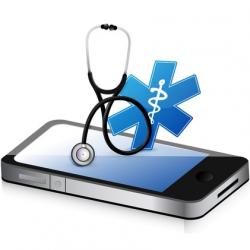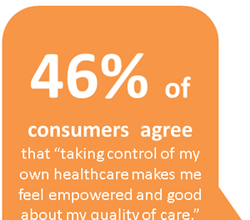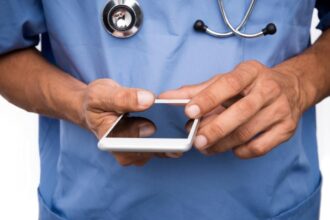The plethora of mobile apps comes under scrutiny and the market grows …
The plethora of mobile apps comes under scrutiny and the market grows …
 The Food and Drug Administration (FDA) has targeted a new iPhone application for scrutiny that allows users to check levels of blood, protein and other substances in their urine. The scrutiny is the first target by U.S. regulators who are making a concerted effort to define the boundaries of consumer versus medical applications that related to medical diagnosis and care. The new product is produced by Biosense Technologies Private Ltd and will be marketed as uChek. The app relies upon users – such as diabetics – to check their glucose levels by dip testing strips in urine and then using the smartphone’s camera to processes and generate automated results. The uChek system works with test strips marketed by Siemens and Bayer. At the present time, these test strips are cleared for visual reading only and not for automated analysis. In a statement on the rationale for reviewing the uChek application, the FDA noted it “…has proposed a regulatory approach that limits its immediate oversight to a specific, small subset of mobile medical applications that are medical devices and present the greatest risk to patient safety if they don’t work as intended.”
The Food and Drug Administration (FDA) has targeted a new iPhone application for scrutiny that allows users to check levels of blood, protein and other substances in their urine. The scrutiny is the first target by U.S. regulators who are making a concerted effort to define the boundaries of consumer versus medical applications that related to medical diagnosis and care. The new product is produced by Biosense Technologies Private Ltd and will be marketed as uChek. The app relies upon users – such as diabetics – to check their glucose levels by dip testing strips in urine and then using the smartphone’s camera to processes and generate automated results. The uChek system works with test strips marketed by Siemens and Bayer. At the present time, these test strips are cleared for visual reading only and not for automated analysis. In a statement on the rationale for reviewing the uChek application, the FDA noted it “…has proposed a regulatory approach that limits its immediate oversight to a specific, small subset of mobile medical applications that are medical devices and present the greatest risk to patient safety if they don’t work as intended.”
Meanwhile, as we say in North Dakota – back at the ranch – the growth in apps for health, fitness, and medical applications is growing by leaps and bounds. At present, there are over 40,000! And, the difficult problem for consumers is trying to find the right app since there is no certification process at the present time. Literally, anyone who writes code for an app can get it published and available on the web. But, that may be changing.
Happtique is a mobile health solutions company that maintains an online catalog of over 15,000 health, fitness, and medical apps, but they are not evaluated for their effectiveness and capabilities. They intend to do both a technical as well as a clinical review of each of the apps in their catalog. On the technical side, they will evaluate apps for malware, security and interoperability. On the clinical side, they intend to have physicians and other clinicians with backgrounds in the areas relevant to the specific app evaluate them for functionality, user-friendliness, and content. The intent is not to “rate” apps but rather to “certify” them so that a “baseline standard” can be created related to app performance, content and safety. Ben Chodor, CEO of Happtique – in announcing their new initiative – stated, “We want to do what the American Dental Association did for toothpaste. They never picked Crest over Colgate. They said: These guys followed the standard for good toothpaste. You pick the flavor and tube you like best.”
Happtique is a for-profit arm of the the Greater New York Hospital Association, which includes over 250 hospitals in New York State. So far, it has announced formal relations on the clinical side with the Association of American Medical Colleges and the Commission on Graduates of Foreign Nursing Schools. They are exploring other relationships as well. The content reviewers will use a set of content standards and associated performance requirements developed by Happtique. Depending on the app, Happtique will select various specialties to perform the reviews based on the fact that the app relates to the practice area of their respective specialty. The goal is to assure that the apps meet a specific standard and then, allow physicians and other clinicians to recommend the apps that best meet the needs of their patients.
So, who is going to buy these apps? Is it purely a consumer phenomenon? It appears that while there is an appeal among consumers for using apps for assisting with health and wellness, it is also clear that providers and insurers are likely to get into the app game. It would not at all be surprising to see one of the new accountable care organizations or a large insurance company decide that a specific app does the “best job” of helping consumers and, then – either provide the app to their clients or – in the case of insurers – allow for payment under an insurance claim. Either way, we’re likely to see a burgeoning use of apps into the future.
The other issue that will no doubt become clearer over the next several years is the role of the physicians in supporting the review of information generated by the apps. Will physicians be reimbursed for their time and effort in reviewing the information generated from an app on a diabetic patient? In the case of a diabetic, if an app could help in more tightly controlling the blood glucose level of the brittle diabetic so that trips to the emergency room or office are mitigated, it’s likely that some consideration will be given for clinical review. If the saves money, expect that the system will want to pay clinicians for their participation. The question remains; however, on how? And, for what outcome? Those questions remain open and answers are still evolving.
According to Sandy Maliszewski, MD, the overseer of Happtique’s initiative, “Everyone wins when you give an app to a patient. Doctors and patients win because patients stay healthier. Hospitals win because you take your app just like you take your medication, and there’s a better chance that you won’t be readmitted. Insurers win because each time you don’t have to go the emergency department or back to the doctor, they don’t have to pay a premium. Employers win because healthy employees mean less sick time, greater productivity, and lower health insurance costs. Even pharmaceutical companies win, because patients will better adhere to their medication regimens.” So, according to Maliszewski – everyone wins. We shall see. I think the ultimate answer will come down to the effectiveness, efficiency, quality, outcomes, and safety questions that evolve from the use of apps. Those elements are not presently part of the Happtique review program.
We are at the dawning of a new age in scrutiny and review of medical apps. Clearly, industry and the healthcare professions should work together in a collaborative fashion so that the new technologies can be appropriately applied for enhancing outcomes, increasing quality and reducing costs of care delivery. This area will no doubt get increasing attention from all quarters in the coming months and years. More on this topic later …
(image: Smartphone health apps / shutterstock)









